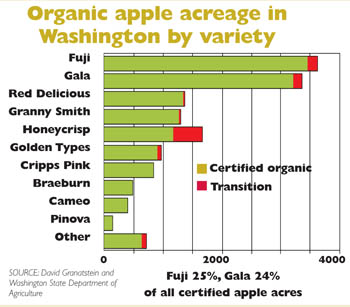 Washington State University’s sustainable agriculture specialist David Granatstein keeps tabs on organic tree fruit production statistics, compiling charts and graphs from data supplied by the Washington State Department of Agriculture. The most recent statistics from 2012 show the following trends:
Washington State University’s sustainable agriculture specialist David Granatstein keeps tabs on organic tree fruit production statistics, compiling charts and graphs from data supplied by the Washington State Department of Agriculture. The most recent statistics from 2012 show the following trends:
Apples
- Certified organic acreage declined in 2012 to 13,655 acres.
- Fuji is the leading organic variety, with nearly 3,500 acres.
- Gala is the second most planted organic variety with around 3,200 acres.
- Honeycrisp, with around 1,200 organic acres, shows the most acres (500) in transition.
- Organic Honeycrisp apples have received the highest prices of all varieties, averaging $20 per box more than other organic varieties.
- Organic apple shipments represent 6.2 percent of total Washington shipments.
- The price differential between conventional and organic for Gala and Fuji apples during the last three years was around $10 per box f.o.b.
- Exports of organic apples in 2012 totalled 650,000 boxes.
- Top export markets for organic apples in 2012 (in order of ranking) were Canada, Asia/South Pacific, Middle East, and Mexico.
Pears
- Certified organic pear acreage has been fairly stable over the past few years at around 1,900 acres, representing 8.6 percent of Washington’s pear acreage.
- Bartlett and d’Anjou are the leading organic varieties, each representing 33 percent of the total organic acreage. Bosc is next with 17 percent of the total.
- Organic share of shipped Washington pears is 6.2 percent.
- F.o.b. prices for organic Bartletts were about $10 more per box than for conventional Bartletts in 2012; the price differential was less than $10 for d’Anjous.
- Exports of organic pears in 2012 totalled 200,000 boxes.
Cherries
- Certified organic acreage for cherries in 2012 was 1,800 acres, representing 4.7 percent of total state acreage.
- Leading variety of organic cherries is not specified, followed by Bing, Chelan, tart cherries, other dark sweet, Rainier, and Skeena.
- Organic cherries fetched an average of $15 more per box f.o.b. than conventional cherries in 2012. —M. Hansen

Leave A Comment